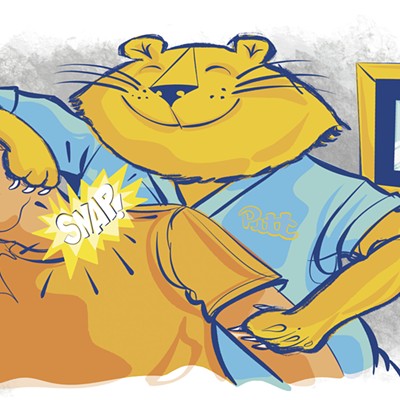Spend a morning in the courtroom of Judge Joseph James, listening to lawyers demand that candidates be removed from the ballot, and you'll wonder why we bother with elections at all.
During the March 21 hearings -- which are an election-season ritual -- James did his best to make sure that any candidate who filed got the chance to run. However, even when giving candidates the benefit of the doubt, James still had to remove some from the ballot. About a dozen candidates were removed from the ballot in city, county and local races.
"There is some black-letter law that we will apply," James said before calling the first case. "I take no satisfaction in striking someone from the ballot, but I will enforce the law."
Sure enough, he soon had to remove a first-time candidate for Sharpsburg's borough council from the ballot. She had filed her financial-disclosure late, because the forms and instructions confused her.
"I'm very sorry," the judge said.
During the petition-challenge process, the same lawyers can show up on opposite sides in the same race ... and the "concerned citizens" who challenge a candidate often have more political connections than members of the Kennedy family.
Take, for example, the race for Len Bodack's city council seat in District 7. Challenger Patrick Dowd's candidacy had been challenged because his complete financial disclosure documents weren't on file with the city clerk's office by the deadline -- 4:30 p.m. on March 7. Dowd had filed the same paperwork with the county nine minutes earlier, but necessary attachments weren't included with the copy on file with the city. Dowd, who was represented by attorney Isobel Storch, testified that the clerk's office must have misplaced the documents.
However, Kim Clark, an administrative assistant with the city clerk's office who received the paperwork, testified that the attachments must not have been filed to begin with. Also, Mark Wolosik of the county board of elections testified that along with Dowd's county filings were two copies of the financial disclosure documents.
James found Dowd's testimony credible and ruled that he made a substantial effort to file the documents. He permitted Dowd to stay on the ballot.
About 30 minutes later, Tom Fallon, who also filed to run against Bodack, was thrown off the ballot because he didn't disclose that during 2006 he worked as a state legislative aide. Fallon said it was a mistake, but James struck his name from the ballot.
The attorney for the concerned citizen who had Fallon's name stricken? Isobel Storch, who half an hour before had fought to keep Dowd on the ballot.
Was Dowd behind the challenge to Fallon? Removing a challenger from the ballot would arguably be a strange position for a reformer -- especially one who often appears at political functions with a broom to symbolize his desire to sweep out the old political machine. But when reporters began questioning Storch in the hallway after the hearing, Dowd campaign manager Abby Wilson interrupted to say Storch had appointments to get to.
Wilson told reporters only that Dowd "looks forward to challenging Councilman Bodack and Councilman Bodack alone on May 15." The two women then hurried away.
In another challenge whose participants' ties to other candidates weren't easy to hide, District 9 council candidate Rachel Cooper -- the endorsed Democrat in the race -- was ejected from the primary because she missed filing deadlines. Cooper filed financial disclosure forms with the city the day after the deadline, though she had filed them across the street at the county board of elections on time.
Cooper faced two challenges -- one from the sister of another candidate, Leah Kirkland, and one from Karen Gilliam, a member of Councilor Twanda Carlisle's re-election committee. Kirkland finished a distant second behind Cooper in the race for the party nomination; Carlisle is the embattled incumbent, the only city officeholder facing re-election not to get the party's endorsement.
Cooper was removed from the ballot, though her attorney, Frederick Frank, said after the hearing that she may decide to appeal James' ruling.
Frank told James his client made substantial efforts to file her paperwork on time, and that no one was denied a chance to review the petition because she essentially filed them two business hours late -- two hours after the clerk's office opened on March 8.
"This process," Frank said, "is not to be used by opponents ... as a ruse to win an election."
Maybe not. But it doesn't hurt.














